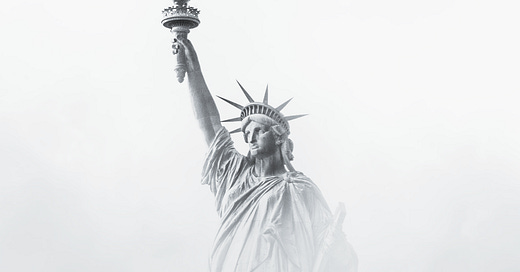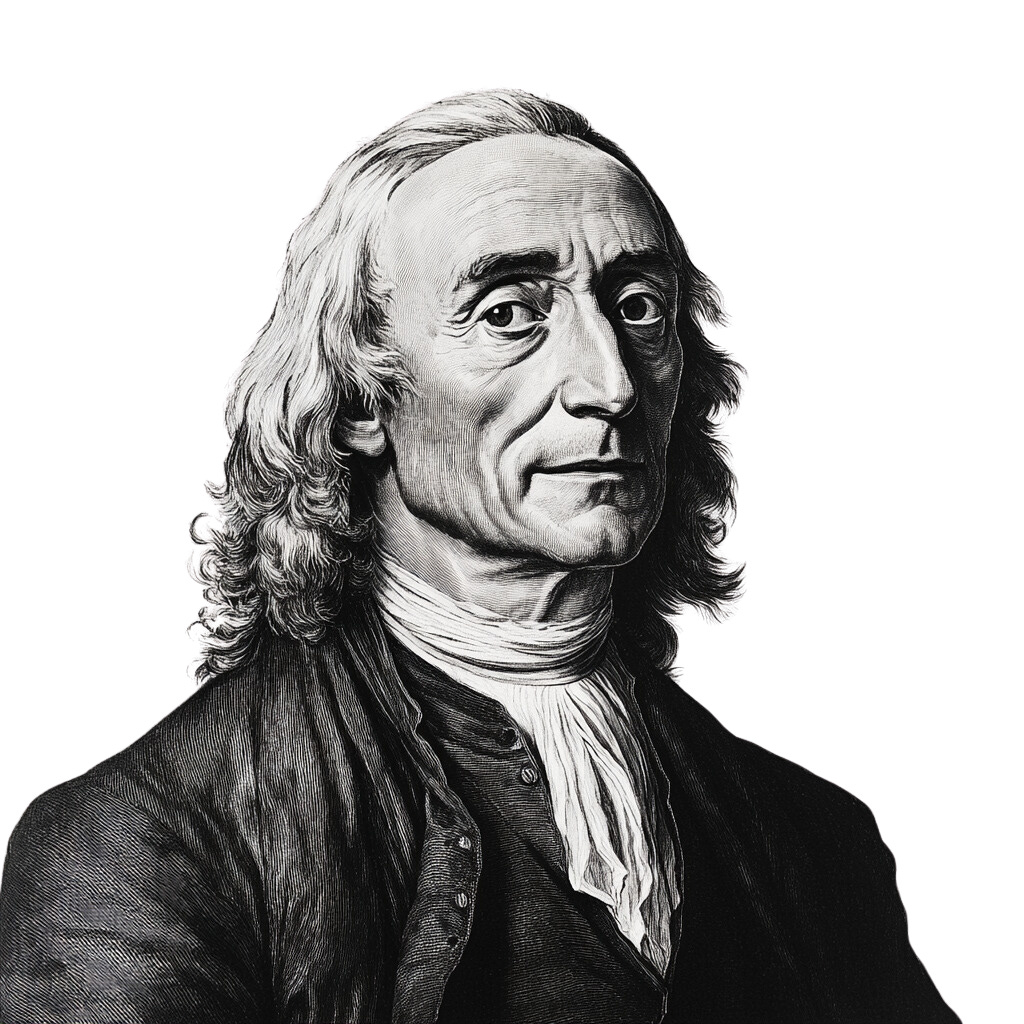The Roots of Liberalism
For the vast majority of humanity’s history, life has been nasty, brutish, and short. The societies our ancestors lived within were miserable. Poverty was almost ubiquitous. A tiny group of ruling elites waged endless bloody conflicts to accrue more power for themselves. Disease ravaged the population, killing most children before they could achieve adulthood.
This grim past was shaped by one group after another—a warlord, a dynasty, a theocracy, an empire. But in the latter half of the second millennium, something miraculous happened. The world finally began to change.
A confluence of factors in Europe transformed society. Mass depopulation following the Black Death caused a radical shift in social dynamics. The rise of a merchant class, detached from agriculture, further shifted the balance of power. Literacy and knowledge spread as the Renaissance fostered a culture of intellectual exploration.
These developments collectively gave rise to a growing recognition of the concept of the individual and a movement towards the pursuit of truth. This intellectual awakening, often referred to as the "Enlightenment," saw its leaders embrace radical ideas for their time. They believed every man should be the author of their own destiny and that the state’s purpose should be to serve the people, not to rule over them.
The leaders of the Enlightenment later came to be known as liberals, and over the coming years, their ideology remade the world. They deposed monarchs, abolished hereditary privilege, and threw out the divine right of kings. They overturned the feudal system, slashed barriers to trade and exchange, and combatted state-sponsored monopolization.
In the process of dismantling the old, liberals also constructed the new. They replaced absolute monarchies with liberal democracies. And they exchanged the feudal-mercantilist order for capitalism.
“It is not from the benevolence of the butcher, the brewer, or the baker, that we expect our dinner, but from their regard to their own interest.” — Adam Smith
Gradually, liberals established, for the first time in the history of the world, societies where a large part of the population was genuinely free.
Future liberals would build on these gains. Chattel slavery, which was once ubiquitous, was rendered virtually extinct. Suffrage and basic rights were extended to much of the global population. Colonial empires were dismantled. International institutions were created. For most of history, these radical changes would’ve been unthinkable.
And with these victories came the most tremendous improvement in our quality of life ever seen. Civilization witnessed the phenomenal wonders that occur when people—unobstructed by violence—are left to their own devices. Living standards rose exponentially as a result, elevated by a wave of scientific and technological innovation. A series of industrial revolutions transformed subsistence economies and unlocked previously unseen levels of abundance. Yet, the liberal project has always been far from complete.
“Liberty is meaningless where the right to utter one's thoughts and opinions has ceased to exist. That, of all rights, is the dread of tyrants.” — Frederick Douglass
The world has never been entirely free, nor has it always been getting freer.
Since the inception of liberalism, there have been no shortage of authoritarians, and in some periods, these authoritarian forces have been dominant. At one time, these were the reactionary conservatives eager to undo the Enlightenment. They were followed by ultra-nationalists and fascists who eschewed tolerance and pluralism, rejecting the natural equality of all people and seeking homogeneity through an agenda of domination. Later still were the communists, who believed that the next phase of social organization required all economic forces to be subjugated to the control of a centralized state.
Every time illiberal movements like these took power, our species was set back, our progress undone, our joys stripped from us, and our blood needlessly spilled.
Today, the world’s liberal societies face new variations of the same enemies they fought and defeated in the past. Liberalism is an ongoing and eternal battle against illiberalism. But today, the victory of liberalism is far from guaranteed.
Liberalism is like a fire that needs fuel. It falls to each generation to ensure its embers remain lit and shine even through periods of unrelenting darkness.
“I hope ever to see America among the foremost nations in examples of justice and liberality.” — George Washington
The Crisis of Liberalism Today
Today, by almost every metric, the world is an increasingly dangerous and unfree place. The term liberal has been contorted, perverted, and vilified. Its narrative has been relegated to the history books as a collective amnesia of the lessons of history submerges the public discourse. But despair is premature.
In 1939, the survival of liberalism seemed unlikely. Italy and Germany were poised to sweep across Europe, powered by Soviet raw materials (thanks to their new alliance with Stalin). Japanese forces were deep inside China and planning an attack against America and Britain. The US had its head in the sand and ignored the coming storm. Nevertheless, 6 years later, Fascism was a dead letter, defeated in the depths of the Pacific and on the beaches of Normandy. 46 years after that, communism had its date with destiny, as the Warsaw Pact collapsed and the Soviet Union dissolved into its constituent republics.
Liberalism has triumphed against the odds before, and it can triumph again.
Yet, there must be no illusions about the current perils it faces. The free nations of the world are in decline. Their economies have slowed, their influence has deteriorated, and some have fallen back into their old authoritarian ways. As these events have occurred, the world’s dictatorships and theocracies have been emboldened, growing their spheres of influence and attempting to reconstruct the empires of old.
In the wake of these events, liberalism’s enemies at home have grown louder. A tidal wave of authoritarian populist movements has swept over the West, eroding institutions and advancing an agenda of forced homogeneity and control.
These authoritarians come under many banners and with many different names, but they are far more similar than they are different. They present the world as fundamentally a zero-sum game—a tug-of-war between competing groups. They insist that liberal institutions—the press, academia, and the like—are all fundamentally compromised and illegitimate and must, therefore, be dismantled. They reject any inconvenient truth that conflicts with their ideology and construct alternative fantasies rife with falsehoods, scapegoats, and misrepresentations. They assure us that utopia awaits if only their imagined enemies are crushed.
There is nothing new about the many ideas of authoritarian control that are reincarnating before us. In fact, they are among the most tested and failed ideas in the history of the world. Despite this, they are almost destined to reincarnate with each generation because they tap into humanity’s innate psychological imperfections:
Our impulse to blame our problems on others
Our desire for simple solutions to complex problems
Our dreams of utopia just beyond our reach
Our fear of change
Our animus toward difference
Our desire for superiority
As long as humans remain imperfect, there will be authoritarians, and there will need to be liberals prepared to face them. In the present moment, most necessary is dispelling the central authoritarian fiction: that liberalism is the root of our social ills.
Today’s authoritarians tell us that our problems have been caused by our liberalism—that in some way, for some reason, free association and self-determination have yielded the dilemmas we currently endure. They claim that the solution to these problems is found only in a far more expansive state, one that uses its force to quash the supposed ugly products of a free society.
What these demagogues ignore is that even the world’s “liberal” democracies are, in many ways, far from liberal. Western governments have become corrupted and invasive, commanding their tremendous powers to satisfy rent-seeking special interests and members of the political class.
As a result, economies have been crippled by tremendous restrictions on trade and movement, an expensive labyrinth of subsidies and tax preferences, ballooning government debt, piles of anti-competitive regulation, and, ultimately, stagnation.
Simultaneously, in many nations, dissenters are muzzled by cultures of censorship and cancellation. The collectivist worldview, one where people are viewed not based on their personal attributes but rather their immutable characteristics, are becoming dominant in society once again. The state frequently employs mechanisms of social control and engineering, seeking to contort society to fit the moral sensibilities of those with power.
Make no mistake, there is nothing liberal about any of this. The world’s free nations are considered free not because they are entirely so but because they have managed to escape the most evil and pernicious authoritarianisms that have dominated our species since its inception.
The truth is the decline of liberal values in the West has created the grievances modern authoritarians capitalize on. The answer to these grievances is not to deepen the authoritarian structures within society but instead to abolish them.
The Path Forward
In the face of the crises of modernity, the West’s advocates for a free and open society have been caught flat-footed.
Liberals everywhere find themselves scattered and without an identity or banner because of the increased misunderstanding of the word “liberalism” itself has become confused. In the United States, it has been equated with big-government progressivism. In other countries, there is also confusion, but it manifests in different ways.
In each context, there have been efforts by some liberals to use different words to describe themselves. Some in the United States have decided to replace “liberal” with terms like “centrist,” “moderate,” or “independent.”
This choice puts them in a fundamentally precarious position. These liberals find themselves severed from their own intellectual heritage. They are cut off from the language of true liberalism and are, therefore, missing the identity needed to build a cohesive political movement. This confusion must end.
Project Liberal’s purpose is to solve this problem by reestablishing liberalism as a distinct political identity—equipped with the right language for its ideas—and prepared to outline the policies that can realize its values.
Liberals can no longer remain fragmented, clinging to meaningless labels, attempting to dodge the misconceptions typically associated with the term liberal. Nor can they continue to struggle merely to defend the present state affairs from the forces that wish to make it worse.
The present demands liberals go on offense, demonstrating the true causes of our problems and championing ambitious solutions needed to solve them.
The Principles of the New Liberal Movement
In advancing the construction of a liberal movement, Project Liberal will rely on the following statements of principle:
1. GOVERNMENT MUST SERVE THE PEOPLE.
Our governments are failing us. They have become corrupted and short-sighted, falling miserably short of fulfilling even their most basic responsibilities. As our needs go unmet, our livelihoods are undermined by a litany of invasive state activities that exist not to benefit us but to enrich powerful interests at our expense. Autocrats dodge accountability under the law or even use it as a weapon against their enemies. Our deeply dysfunctional political institutions are to blame. They consistently deliver only one result: broken promises. We will not tolerate more of the same. The government must be restored to its essential role as a purveyor of the public interest, based on the consent of the governed, and no longer be subject to the exploitation of lobbyists and the political class.
2. ALL PEOPLE ARE CREATED EQUAL.
Prejudice is as old as time, yet it has never ceased to be irrational and morally repugnant. Today, it remains powerful as demagogues exploit age-old bigotries for their own political purposes. We clearly see these politicians and pundits for who they truly are: cynics who weaponize ignorance in their quest for power. In the face of their deceit, we repeat truths. Immigrants are not our enemy. No racial or ethnic group is inferior. Men are not entitled to lead, nor are women required to follow. Each person should be judged solely on their own merits, not their immutable characteristics.
3. FREE ENTERPRISE CREATES ABUNDANCE.
We reject the dogma that markets can do no wrong, but we also reject the far more pervasive dogma that the state is benevolent. It is far from it. We have endured the burden of its agenda of artificial scarcity, and we know full well that the political actors who control it do not have our best interests in mind. We stand steadfastly against both the cronyist economic order we live under and those who wish to revive long-tried and failed statist economic ideas. In place of this system, we endorse a dynamic free-enterprise economy where competition is abundant and prosperity widespread.
4. YOUR LIFE IS YOURS TO LIVE.
Those who worship at the altar of the state look to the government to cure all ills. They imagine using its power to force people to embrace the "correct" lifestyle. These are the bedroom regulators, the religion mandaters, the speech censorers, and the virtue enforcers—among many other titles. Their ideas about what the "right" life is are always changing, but they have made a grave mistake. The state is not our God. It is not our moral leader nor the arbiter of truth. It exists to follow our will and serve our needs, not to assert dominion over us. Your personal decisions are yours and yours alone to make and ours to tolerate.
5. PEACE REQUIRES STRENGTH.
The world is full of imperialist and chauvinist states eager to exploit every weakness in their relentless pursuit of control. In these times, the world's free nations can no longer afford to be feeble. The religion of appeasement—a worldview characterized by constant retreat and self-hatred—is impressed upon us by a seductive narrative spun by foreign-funded propagandists. We must no longer be fooled by these delusions. Isolationism is a recipe for war, and we will not embrace it. But while rejecting this dark path, we remain vigilant against the warmongers—those who promote reckless and costly unilateral action. Our cause is an enduring peace, and we are resolute in its pursuit.
6. TRUTH EXISTS AND IT MATTERS.
We reject the vicious lie told by pseudo-intellectuals and the conspiracy-deranged that academics, scientists, and journalists are the enemy. We know well that our true foe lies not in those dedicated to the pursuit of truth but rather in those who seek to contort reality to further their own agenda. We also strongly oppose the relativistic notion that the world is not bound together by facts and that all things are merely "matters of opinion." We believe in one unifying truth and commit ourselves to its impartial and rigorous pursuit, even when its nuances clash with our preconceived notions.
7. THE STATUS QUO IS UNACCEPTABLE.
The existing system is failing. No message that tells people that their lives are better than they see or believe will succeed—nor should it. We must do better. Populist rage is, in and of itself, reflective of a failure of existing institutions to address real problems. Despite this, the populist movements of today do not offer us a better future; they offer aggressive regression and destruction. However, the angst, anxieties, and frustrations they tap into are real, and we will not ignore them.
This manifesto was produced by the team at Project Liberal Action.
Learn more about the liberal movement we’re building by visiting our website here.
















Hey Josh! I'm so glad to see you here, and I like what you are doing with this post. I think the big challege is that this is not being taught in schools anymore, and the univeristies are actively denigrating these ideals. I'm working on some reforms to change that here in Tennessee. Let me know when you and the crew get back this way. I'd love to fill you in and share insights.
*So* close. You speak the words of liberation, and I do believe that they are borne of conviction. But you fail to see that the unchecked capitalist system is what led us to this. “Free Enterprise”… free to do what?
Free to accumulate power in the hands of the few, to grind liberalism to dust. To make new kings under a new name—oligarchs
As the first liberals denied the divine right of kings, we too must deny the oligarchs’ divine right of free enterprise. The free market must be more critically examined, more carefully restructured and, yes, constrained. Just as we sacrifice our liberty to kill, and to rape, and to steal, the market must sacrifice its liberty to kill, and to rape, and to steal.
Or it will never stop. Like the monarchists who understood the need for liberation, but still knelt to the crown, you still cling to the free market. *Let it go*.
https://substack.com/@stonewall757/note/p-161243790?r=5fwygn&utm_medium=ios&utm_source=notes-share-action